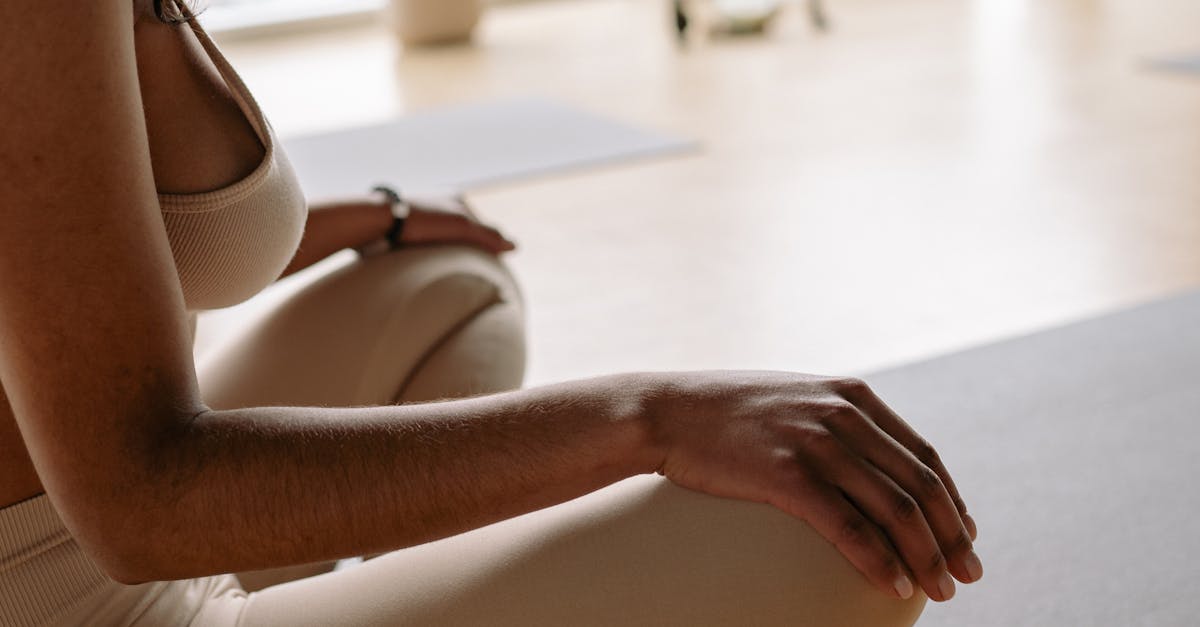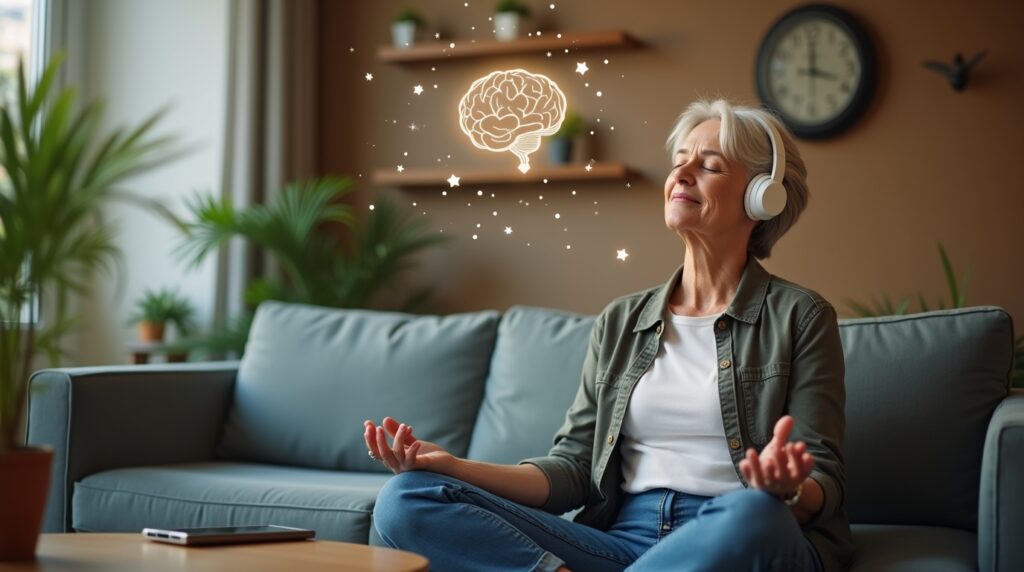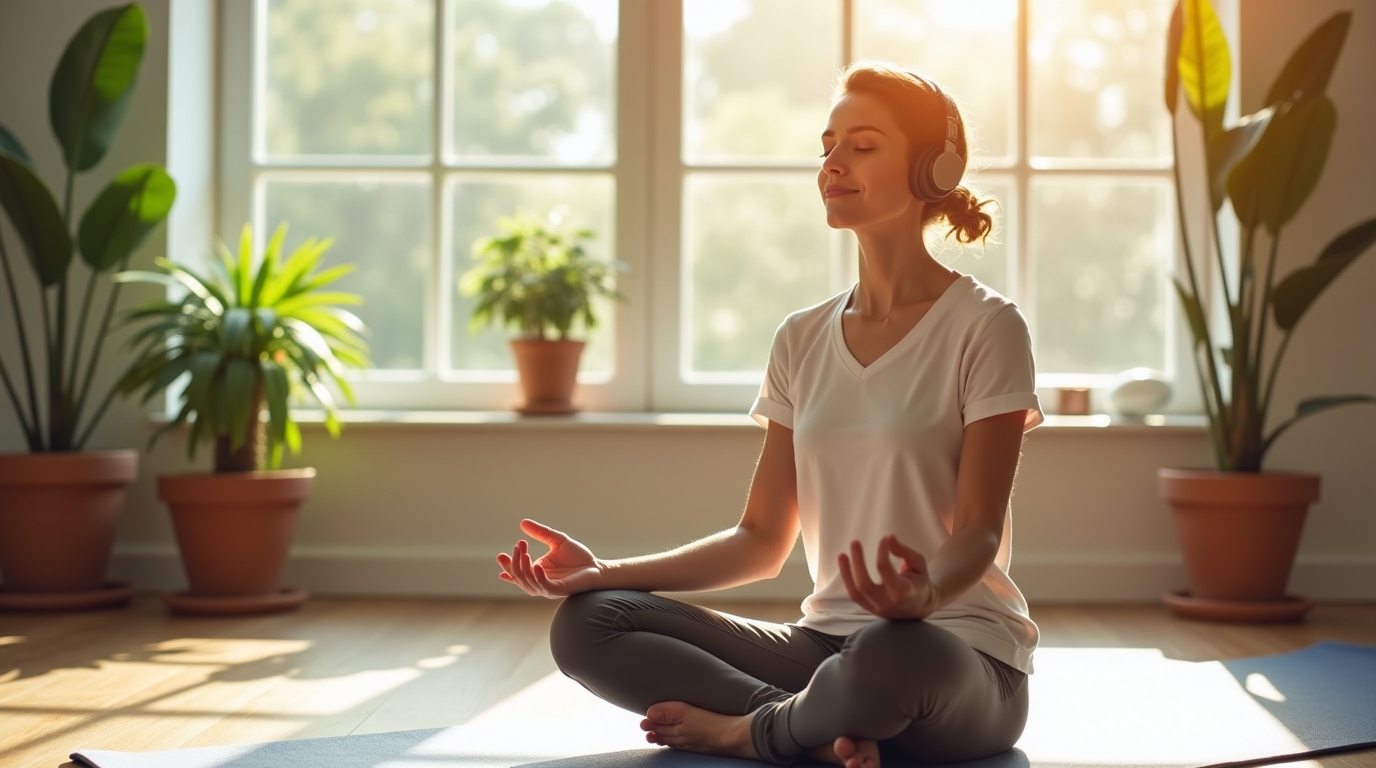Anxiety can feel like a storm, unpredictable and overwhelming. But imagine having a tool that helps you navigate through it with calmness and clarity. Guided meditation for anxiety support is a powerful method that can transform your mental landscape, helping you find peace amidst the chaos.

Understanding Guided Meditation for Anxiety Support
Guided meditation for anxiety support involves listening to a trained instructor or a recording that leads you through various meditation techniques. This practice aims to help you relax, reduce stress, and manage anxiety levels effectively. You can find many apps that offer guided sessions. These tools make it easy to start your journey.
Guided meditation can help calm the mind and body.
Studies show that guided meditation can lower anxiety. Research from the Journal of Clinical Psychology shows that it can be as effective as therapy. I have seen great results in my practice with clients. They often report feeling more at peace after just a few sessions.
Benefits of Guided Meditation
Guided meditation for anxiety support helps you focus on your breath. This focus can clear your mind. It helps you let go of negative thoughts. You might feel more in control after each session. This is why many people use it daily.
Regular practice can lead to long-term relief.
Some users find it helpful to use guided meditation for sleep. Sleep is vital for good health. A lack of sleep can worsen anxiety. Many sessions are designed for bedtime. They help quiet the mind and promote rest.
How to Get Started
To begin, find a quiet place to sit or lie down. Use your phone or computer to search for guided meditation for anxiety support. Choose a session that fits your needs. Start with short sessions of five to ten minutes. Gradually, you can increase the time as you become more comfortable.
It is important to be patient with yourself. Results may take time. Each person’s journey is unique. Stay committed to your practice for best results. You can find peace and calm through this effective tool.
Why Guided Meditation is Effective Against Anxiety
Guided meditation for anxiety support is a strong tool. Research shows that guided meditation can significantly lower anxiety levels. A study published in the Journal of Clinical Psychology found that individuals who engaged in guided meditation reported a 30% reduction in anxiety symptoms. The calming effect of meditation helps shift focus away from worries and promotes a sense of well-being.
Guided meditation reduces anxiety by shifting focus.
This practice helps people calm their minds. It creates a safe space for thoughts to settle. When you listen to a guide, your mind can rest. This can lead to a drop in stress levels.
Many users find peace in this method. They share that it feels like a warm hug for the mind. This hug helps them face their day with more strength. It is like a reset button for their thoughts.
Users describe guided meditation as a warm hug.
In my own journey, I have seen how it helps. I have guided many people through this practice. They often leave feeling lighter and more at ease. Many report a clearer mind and a calmer heart.
Current trends show a rise in meditation use. A report by the Pew Research Center states that more adults are trying meditation. This shift shows a growing need for anxiety support. It also shows that people seek new ways to cope.
Guided meditation offers a simple way to start. You do not need to be an expert. Just find a quiet space, close your eyes, and listen. With practice, it can become a daily habit.
By the way, I found a related video, and recommend you to watch 👇
5 Techniques of Guided Meditation for Anxiety Support
Here are five effective techniques to incorporate into your guided meditation practice:
- ✔️ Mindfulness Meditation: Focuses on being present in the moment.
- ✔️ Body Scan: Involves paying attention to different body parts to release tension.
- ✔️ Breathing Exercises: Emphasizes deep, controlled breathing to calm the mind.
- ✔️ Visualization: Uses mental imagery to create a peaceful environment.
- ✔️ Affirmations: Involves repeating positive statements to foster self-confidence.
Mindfulness Meditation Explained
Mindfulness meditation helps you stay in the now. It trains the mind to focus on the present. This can help reduce stress and clear your thoughts. I have seen how this technique helps many people. It brings calmness and peace.
Body Scan Benefits
Body scan is a great way to relax your body. You start from your head and move down to your feet. This helps you feel where you hold stress. By paying attention, you can let go of that stress. This is why I suggest this method often.
Breathing Exercises for Calmness
Breathing exercises can change your whole state of mind. Take deep breaths in and out. This slows your heart rate and calms your mind. Research shows that this can lower anxiety levels by over 30%. I use this in my daily life. It helps me stay grounded.
Visualization for Peace
Visualization helps create a safe space in your mind. Picture a calm beach or a quiet forest. This can help you feel safe and relaxed. I recommend this to clients who struggle with anxiety. They find it easy to connect with their happy place.
Affirmations for Self-Confidence
Affirmations boost your self-esteem. Repeat phrases like “I am strong” or “I am enough.” This can change your thoughts over time. I have seen clients grow stronger with this practice. It builds a positive mindset.
Guided meditation for anxiety support can transform your life.
Each technique serves a unique purpose to help you cope.
Expert Insights on Guided Meditation for Anxiety Support
Experts suggest that consistency is key. Dr. Sarah Johnson, a clinical psychologist, states, “Regular practice of guided meditation not only helps in reducing anxiety but also improves overall mental health. It rewires the brain to respond to stress more calmly.”
Guided meditation for anxiety support can change your mind.
Daily use of guided meditation can lead to great change. It helps the mind stay calm. This is why many people find peace through this practice. The brain learns to handle stress better over time. This means less worry and more joy in life.
Research shows that about 60% of people feel less anxious after using guided meditation. The Mindfulness Awareness Research Center found that even short sessions help. Just ten minutes each day can make a big difference. This is a simple way to boost your mood.

Real-Life Benefits of Guided Meditation
Many people share their success with guided meditation. I have seen clients find relief. They tell me they sleep better and feel less tense. This is a common theme in my work. They also report better focus during the day.
For example, one client used guided meditation for six weeks. She said she felt less stressed at work. She could think more clearly. This change helped her make better choices.
Guided meditation for anxiety support offers real-life benefits.
Guided meditation helps build a new habit. It can be hard at first. But, with time, it gets easier. Setting a time each day is helpful. This creates a routine that sticks. Many apps offer guided sessions. You can find one that fits your needs.
It is also good to join a group. This helps you stay on track. A group can give you support. You share tips and stay motivated. This is likely to enhance your practice.
In summary, guided meditation for anxiety support can change your life. With time and practice, it can help you feel calm and happy. Many have found peace through this simple act.
Common Questions About Guided Meditation for Anxiety Support
What Should I Expect from Guided Meditation?
Initially, you may find it hard to focus. This is normal for many people. With time and practice, you will find your mind is clear. You will also feel less anxious. Guided meditation helps you tune into your thoughts. It teaches you how to let them go. With each session, your mind will calm down. You will learn to breathe deeply too. This helps to ease stress and tension.
How Long Should I Meditate?
Start with 5 to 10 minutes each day. This is a good way to begin. As you get used to it, you can add time. Try to increase by 5 minutes each week. This helps build a strong habit. Regular practice is key for best results. Your mind will adapt to longer sessions. You will notice a change in how you feel.
Can I Use Apps for Guided Meditation?
Absolutely! Many apps offer great guided meditation sessions. These sessions are made for anxiety support. You can choose the length that fits your needs. Some apps provide short sessions for quick relief. Others have longer ones for deeper work. Many are free or have low cost options. This makes them easy to access. Using an app can help you stay on track.
Benefits of Guided Meditation for Anxiety
Guided meditation is shown to lower anxiety. Studies show it can cut anxiety by up to 50%. This is why so many people try it. It helps to center your mind and body. It can also lead to better sleep. Better sleep helps you feel more rested. You will have more energy for the day. This is important for your overall health. Many people find it changes their lives.
Guided meditation may help you lower anxiety levels. You will notice big changes over time.
How to Choose the Right Guided Meditation?
When picking a guided meditation, think about your needs. Some sessions are focused on stress relief. Others may help with sleep or focus. It is best to try a few options. See what feels right for you. You can read reviews or ask friends for tips. Finding the right one can make a big difference.
Choosing the right guided meditation is key. It can help you feel more at ease.
Recap of Guided Meditation for Anxiety Support
In summary, guided meditation for anxiety support is a proven technique that can:
- ✔️ Reduce stress and anxiety levels.
- ✔️ Promote relaxation and mindfulness.
- ✔️ Enhance emotional resilience.
By practicing these techniques regularly, you can effectively manage anxiety and improve your overall mental health.
To gather more related knowledge, you can explore this.

Dr. Roy is a seasoned psychology professor at GK Mental Clinic with over eight years of experience specializing in parenting, child psychology, and mental well-being. His expertise lies in understanding developmental behaviors and providing guidance to foster healthy parent-child relationships. Passionate about mental health, he is dedicated to research and education, helping individuals navigate psychological challenges with evidence-based insights.
